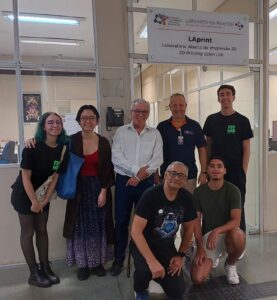With information from researcher Neilo Trindade and Rhodes University.
Students Isabela Ferreira and Matheus Cavalcanti, under the guidance of Prof. Neilo Trindade from IFUSP, are currently at Rhodes University in South Africa on an exchange program to learn more about the luminescence properties of Brazilian natural minerals. Both are FAPESP scholarship recipients and are realizing their first international trip through this initiative. A third student, Alexia Oliveira Silva, is also preparing to participate in the program starting in August.
The Department of Physics and Electronics at Rhodes University has internationally respected research programs in experimental solid-state physics, with a broad range of activities spanning from theoretical physics to physics pedagogy. The primary focus is on The Square Kilometre Array Radio Telescope – SKAO. Once completed, it will be the world’s largest telescope and one of the largest scientific projects ever conceived. In the area of interest to researcher Neilo Trindade, the highlight is the Luminescence Research Laboratory at Rhodes University, which is the only one in South Africa involved in fundamental research on the physics of point defects in solids. Regarding the significance of this laboratory, Neilo Trindade comments, “The Luminescence Research Laboratory’s most significant feature is a versatile light-emitting diode system for time-resolved luminescence spectrum measurements. The instrument is based on pulsed light-emitting diodes at 470 nm and 525 nm and was built in-house. Professor Makaiko Chithambo’s team works with various natural and synthetic materials applied to radiation dosimetry, with dozens of publications and significant impact in the field, becoming a reference on the subject. Professor Chithambo has 42 publications on quartz out of a total of 132 publications, in addition to writing a book on an introduction to time-resolved optically stimulated luminescence, the main topics of this research stage.”
The relationship between the universities was established through contact between Neilo Trindade and Prof. Makaiko Chithambo, the head of the Department of Physics and Electronics at Rhodes University; both have two co-authored articles. Trindade recalls, “The closer relationship with Prof. Chithambo started from a SBPMAT conference (Brazilian Society for Research in Materials) that I organized, and he was one of the invited speakers. During the event, we had a parallel meeting, he showed interest in our work, and mentioned he could contribute. That’s how we started the exchange.” Besides the visit of Brazilian students, Chithambo also plans to bring Rhodes students to USP. The program allows students to visit the host university for a month or more while enrolled at their home institutions.
Exchange students Isabela and Matheus reflect on the enriching experience of studying and visiting an environment so different from their own (the campus of Rhodes University is situated in the small and serene town of Makhanda, while the students are from São Paulo) while receiving a warm welcome from the team. “We always take pleasure in welcoming visiting students and academics to our campus at Rhodes University,” says Orla Quinlan, Director of Internationalization at Rhodes University. “It is especially good to hear enthusiastic first impressions and new perspectives from visitors who have never been here before. It is uplifting for everyone.”


